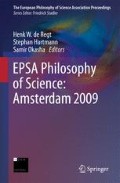Abstract
Until the 1990s philosophers took it almost for granted that the common cause principle is at odds with quantum theory. Roughly, they argued that a common cause explanation of correlations between four pairs of events leads inevitably to Bell inequalities, and since Bell inequalities are violated in quantum theory, there cannot be a common cause explanation of quantum correlations. Redei and his collaborators have made a two-fold effort in order to under-cut the implication from the assumption of a common cause (henceforth, CC) to Bell Inequalities. First, they claimed that it’s not the assumption of a CC for each pair of correlated events that leads to the inequalities but the distinct assumption that there is a CC for all four pairs of projection operators that are correlated; this is the common-common cause hypothesis to which I shall return below. The other important contribution is the formulation of the principle of CC in algebraic quantum field theory (henceforth, AQFT) and the proof of the existence of a CC that explains quantum correlations which are prescribed by the violation of Bell inequalities for a state of the system. Hence, not only there is nothing odd in the CC explanation of quantum correlations, but moreover, the violation of Bell inequalities for a pair of spacelike regions and for a state of the system is a sufficient condition for the existence of quantum correlations, that may be explainable in terms of CCs.
Access this chapter
Tax calculation will be finalised at checkout
Purchases are for personal use only
Notes
- 1.
Private communication during the EPSA ’09 conference.
- 2.
Respectively, P 2 is said to be coarser or strictly coarser than P 1.
References
Bell, J.S. 1971. Introduction to the hidden variable question. In Speakable and unspeakable in quantum mechanics, ed. J.S. Bell, 29–39. Cambridge: Cambridge University Press.
Clauser, J.F., and M.A. Horne. 1974. Experimental consequences of objective local theories. Physical Review D 10: 526–535.
Clauser, J.F., and A. Shimony. 1978. Bell’s theorem: Experimental tests and implications. Reports on Progress in Physics 41: 1881–1927.
Hofer-Szabó, G., and M. Redei. 2004. Reichenbachian common cause systems. International Journal of Theoretical Physics 43: 1819–1826.
Hofer-Szabó, G., and M. Redei. 2006. Reichenbachian common cause systems of arbitrary finite size exist. Foundations of Physics 36: 745–756.
Hofer-Szabó, G., M. Redei, and L.E. Sazabó. 1999. On Reichenbach’s common cause principle and Reichenbach’s notion of common cause. British Journal for the Philosophy of Science 50: 377–399
Landau, L.J. 1987. On the violation of Bell’s inequalities in quantum theory. Physics Letters A 120: 54–56.
Redei, M. 1996. Reichenbach’s common cause principle in quantum field theory. Foundations of Physics 27: 1309–1321.
Redei, M., and S.J. Summers. 2002. Local primitive causality and the common cause principle in quantum field theory. Foundations of Physics 32: 335–355.
Redei, M., and S.J. Summers. 2005. Remarks on causality in relativistic quantum field theory. International Journal of Theoretical Physics 44: 1029–1039.
Sakai, S. 1971. C*-algebras and W*-algebras. Berlin, Heidelberg, New York: Springer.
Summers, S.J., and R. Werner. 1987. Bell’s inequalities and quantum field theory I. Journal of Mathematical Physics 28: 2440–2447.
Acknowledgments
I want to thank A. Arageorgis for his substantial help in this paper and A. Spanou for the final “word-haircut”.
Author information
Authors and Affiliations
Corresponding author
Editor information
Editors and Affiliations
Rights and permissions
Copyright information
© 2012 Springer Science+Business Media B.V.
About this paper
Cite this paper
Stergiou, C. (2012). Two Comments on the Common Cause Principle in Algebraic Quantum Field Theory. In: de Regt, H., Hartmann, S., Okasha, S. (eds) EPSA Philosophy of Science: Amsterdam 2009. The European Philosophy of Science Association Proceedings, vol 1. Springer, Dordrecht. https://doi.org/10.1007/978-94-007-2404-4_32
Download citation
DOI: https://doi.org/10.1007/978-94-007-2404-4_32
Published:
Publisher Name: Springer, Dordrecht
Print ISBN: 978-94-007-2403-7
Online ISBN: 978-94-007-2404-4
eBook Packages: Humanities, Social Sciences and LawPhilosophy and Religion (R0)

